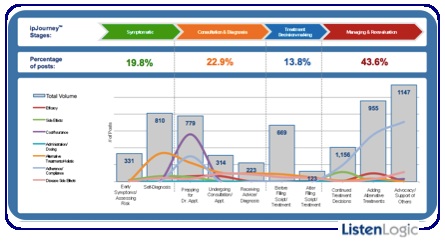As millions of patients turn to websites, social networks and mobile devices to share their health experiences and learn about treatment information, an incredible resource for health providers and pharmaceutical companies has emerged. Today, according to Manhattan Research, nearly 170 million US consumers research health information online and over 110 million seek out online information specific to prescription medication.
As millions of patients turn to websites, social networks and mobile devices to share their health experiences and learn about treatment information, an incredible resource for health providers and pharmaceutical companies has emerged. Today, according to Manhattan Research, nearly 170 million US consumers research health information online and over 110 million seek out online information specific to prescription medication.
With patients growing more comfortable engaging in health-related discussions online, a wealth of understanding is now at the fingertips of the health industry. The key is utilizing the right solution that enables big data processing of the massive volume of publicly available patient commentary to gain deep understanding of patient, caregiver and healthcare provider (HCP) needs, concerns, decisions and actions to deliver better service and treatment.
Already, several large health and pharmaceutical companies are leveraging this advanced big data social intelligence approach to ultimately better understand the patient.
Here are five innovative ways advanced social intelligence is being used to gain better patient understanding and deliver better health solutions.
Patient Journey Analysis
Analyzing millions of online patient discussions provides a robust mapping and understanding of the journey a patient travels throughout their illness. From early symptom identification and self-diagnosis to HCP engagement and treatment decisions and beyond, the health and pharmaceutical industry now has the ability to understand patient concerns, actions, needs and decisions to guide their own strategic decisions related to everything from patient education to product development to HCP outreach.

Identifying Unmet Patient Needs
Among the major value points of advanced social intelligence is the genuine, unbiased insight unsolicited commentary provides. Many patients are apprehensive or gaiting with their information with HCPs. However, they tend to be forthright when engaging health topics via online channels and social networks. This allows for unmet patient needs to be identified across a large population of patients to identify trends and issues. These unmet patient needs are often related to symptom management, treatment options, side effects and condition education, to name a few. Identifying unmet patient needs allows health providers and pharmaceutical companies to understand these gaps strategically address them for patients.
Understanding Patient Types
One critical aspect of healthcare is the premise that all patients are very different in their attitudes, approaches, understanding and communications. However, taking a widespread approach across millions of patients allows “personas” to be built to better understand these patient attitudes and approaches, and also to gain insight on treatment needs, usage and efficacy, condition severities, demographics and sympt
oms. This, in turn, is used by health and pharmaceutical providers to adjust products, packaging, messaging, education and outreach to enhance patient experience.
Discussion Theme Insight
While understanding the patient personas is important, so is the ability to identify the discussion themes patients have related to topics like symptoms, diagnosis and treatments. However, the online and social health discussions tend to go much deeper in terms of adherence, efficacy, lifestyle impact, side effects, switching medications and cost. This provides health and pharmaceutical providers with deep insight into issues and ultimately decision drivers for patients related to their treatments. It allows these providers to un
derstand wide array of elements that can impact the efficacy of their treatments and medications.
Listening to Caregivers
One critical aspect of healthcare that is often overlooked is the caregiver. Whether a parent, spouse, child or other family member, caregivers are major influencers in nearly every aspect of the patient’s journey, particularly with decision-making in most cases. Advanced social intelligence allows for these caregivers to also be understood on a multi-dimensional level like never before in terms of their “personas,” attitudes, approaches, needs, concerns and decisions. This delivers wider and deeper insight to health companies to allow them to effectively engage and educate caregivers as well to ultimately provide enhanced patient care. Many pharmaceutical companies in particular are using this deep caregiver intelligence to not only better understand the patient’s use of their products, but also as an effective engagement point to message and inform the caregiver in the treatment of the patient.
The Diagnosis
As the comfort level of patients engaging in online channels and social networks for health information increases so does the value of the intelligence available to health and pharmaceutical providers. Patients and caregivers can now be understood on a robust multi-dimensional level like never before. However, this can only be achieved with big data processing to keep pace with the continual, massive volume of social and online discussions. One advanced social intelligence provider, ListenLogic, has the capability to process streaming big data. In fact healthcare companies, including over half of the Top 40 pharmaceuticals rely on this platform to gain the deep insight needed to drive product innovation, messaging and ultimately patient care.